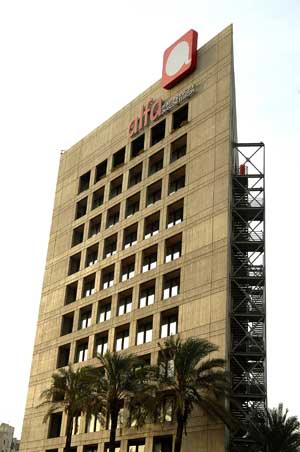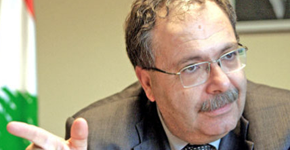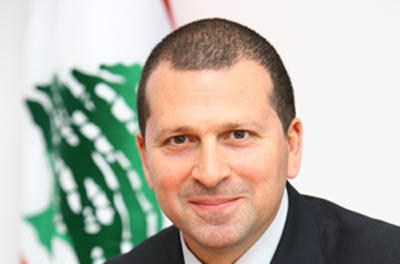Lebanon Telecom: Assessment of Lebanese Telecom and IT sector
The mobile penetration rate in Lebanon is generally reported to be at 28 percent, which is far behind other countries in the region. Although Marwan Hayek, Chairman and CEO of Alfa, one of the two government-owned telecom operators, believes that it is actually 55%. But still, this is significantly lower than that of neighboring countries such as Jordan (74%), or Saudi Arabia (78%).
Lebanese Telecom and IT Sector
Along with infrastructure development, there is probably no sector more ripe for future investment than the IT, telecom, and ICT sector. But the major factor determining timing depends on governmental action—and while everyone expects it to be soon, no one can be sure.
 Take telecom, for example. The mobile penetration rate in Lebanon is generally reported to be at 28 percent, which is far behind other countries in the region. Although Marwan Hayek , Chairman and CEO of Alfa, one of the two government-owned telecom operators, believes that it is
Take telecom, for example. The mobile penetration rate in Lebanon is generally reported to be at 28 percent, which is far behind other countries in the region. Although Marwan Hayek , Chairman and CEO of Alfa, one of the two government-owned telecom operators, believes that it is
actually 55%. But still, this is significantly lower than that of
neighboring countries such as Jordan (74%), or Saudi Arabia (78%).
The problem is that, essentially, the telecom sector is really a state-owned sector, which although two operators are licensed, both are owned indirectly and managed from a policy perspective by the government. This results in three issues. First, the prices paid for telecom and internet service are much higher than average elsewhere. For example, as Salam Yamount, Program Manager at Cisco Systems, points out.
“In Paris, which is the most expensive city in Europe, the user gets cable television and telephone services with a 12MB per second speed for only $45, while in Lebanon the user pays $70 for a speed of 1MB per second.” Clearly, opening up the market to competition would enable this price to be reduced.
The second problem is innovation. Khaldoun Farhat, General Manager of Cable One explains:
“Mobile cellular telephone services were started in Lebanon in 1994 and internet in 1995, and these were early in the Middle East. But for political and strategic reasons the clock stopped in the year 2000, when long-term licenses were no longer granted, only for a year or a few years. And the sector has frozen.” As a result, there has been insufficient modernization and innovation, especially relative to broadband coverage.
Georges Chammas, Co-President of NAVLINK, sees the first and most important problem as the technical:
“I see that the main challenge facing Lebanon today is broadband availability. It is absolutely essential for Lebanon to have a market-oriented broadband approach in order to sustain the growth of the country. There are two main challenges, or chokepoints: the international bandwidth, and access to the International Network. Both are controlled by the government. In order to sustain the growth, broadband access is going to be essential. The government has to open up those two chokepoints.”
Khaldoun Farhat, General Manager of Cable One agrees, noting:
“The World Bank assessed that for a 10% increase in the broadband infrastructure in Lebanon could result in a 1.2-1.5% increase in GDP and the capital expenditure needed for that is far less than the return for one year…If you could remove the regulations and politicians, I think we could see a lot more growth… The solution is reform, privatization, and deregulation of the telecom sector.”
Hope is on the way through the Telecommunications Regulatory Authority (TRA) , which was established in 2002, but not activated until 2007 by the appointment of its members. It has to “establish a regulatory environment that enables a competitive telecommunications market to deliver state-of-the-art services at affordable prices to the broadest spectrum of the Lebanese population.”
Dr. Kamal Shehadi , former Chairman and CEO of TRA, is eager to solve these problems and open up the all the opportunities for investors:
On broadband:
“The potential for investors is tremendous. Most obvious to the work we do as a telecom regulator is broadband access, the potential for which is in the hundreds of millions of dollars. It is a potential that I hope would be open to the private sector, even though getting universal broadband access will, most likely, require some public support.”
On liberalization and privatization:
“I would like to see a clear commitment by the government to opening the telecom sector to competition.”
Overall vision
“It all starts with a vision of a liberalized competitive telecom sector and a commitment to a telecommunications policy whereby all the agencies of the government and the stakeholders in the public and private sector work together to see to it that we have the best telecom market. We have the potential to be innovators in services and applications, be it online teaching, tele-medicine, online software for banks, or a new trading instrument online.”
Dr. Shehadi outlines the steps and challenges—as well as opportunities—in making this happen.
“First, we are at the early stages of liberalization. The incumbent—in this case, the government—is a very big stakeholder, and is not an easy or willing partner. The flip side is that investors are coming in on the ground floor of liberalization and not at the end. The second challenge has to do with the somewhat old rules and regulations that are not appropriate for the 21st century. We’re working with Parliament and various ministries to upgrade all of that. Third, is the increased dependence of the government on telecom revenues. That partly explains the reluctance of some in the government to forge ahead with liberalization.”
But the TRA is “rarin’ to go: “The TRA is ready for it anytime and I don’t think we should delay this anymore.”
no privatization in 2010, and is discussing
the various alternative paths to follow.
According to Marwan Hayek , Chairman and CEO of Alfa, these include: 1) a public-private partnership model; 2) full privatization , with the government selling the assets to new investors; or 3) continuing what is being done today, which is outsourcing the operations to licensed telecom companies that have expertise in this area.
In the meantime, many of the present players in the market are preparing for the inevitable growth that will occur. NAVLINK, according to Georges Chammas , Co-President, plans to open a network operations center as soon as the obstacles are overcome.
Alfa has revamped its entire infrastructure on both the network and IT side. “There was a massive modernization that took place last year,” says Marwan Hayek of Alfa, “to swap all the old systems we had and replace them with newer technologies, which gave us a certain edge from a technological point of view.”
Lebanon Media Center of the Middle East
One dream is that Lebanon will be the media center of the Middle East. Prior to the civil war of 1975-90, it was. Since then, media have headquartered in many other rising Middle East countries. But the dream of being the media center of the region—the “New York City of the Middle East—is not dead”
Dr. Tarek Mitri expresses well the bases for it:
“In Lebanon, the media is free and they have always been free. Our laws are very liberal and our reality is much more liberal than our laws. We have more media  organizations per capita than anywhere else in the world. Had it not been for a longstanding history of media freedom, these organizations would not have come to us from all over the place.”
organizations per capita than anywhere else in the world. Had it not been for a longstanding history of media freedom, these organizations would not have come to us from all over the place.”
Mitri certainly has a point, as Iceland’s recent actions protecting journalists, media, and internet freedoms seems to suggest—stressing freedom of media from censorship and other controls would seem to be possible magnet for media organizations to locate in countries that protect press freedoms. Further, it has a basis in present reality: Lebanon has over 40 newspapers, a rather large number for such a tiny country.
In the 2010 Freedom House report on democratic governance, Lebanon topped all four of its regional peers. The survey is an annual analysis of 32 countries worldwide, based on 1) accountability and public voice; 2) civil liberties; 3) rule of law; and 4) anticorruption and transparency. Lebanon ranked highest in terms of the first three, but was rather weak on the fourth. The other Middle East countries in the survey were Jordan, Bahrain, Yemen, and Saudi Arabia. Globally, Lebanon ranked 21st of all 32 countries surveyed.
